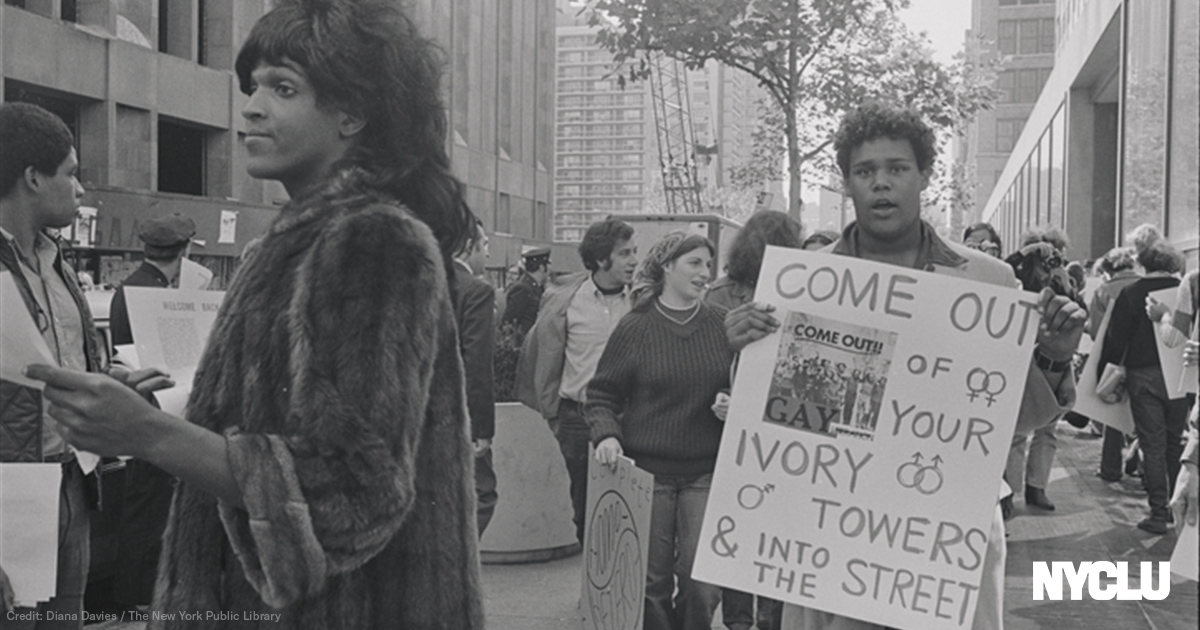Civil Liberties Union
The Deep Connections Between Pride and Black Lives Matter

On June 27, 1969, a police raid of the Stonewall Inn in New York City touched off a series of protests and militant actions that would come to be called the Stonewall Riots.
The uprising was sparked by constant police harassment and repression of the LGBTQ community. From that moment on, Pride was about protest.
Now – 51 years later – people are once again in the streets, protesting police brutality. The fact that these Black Lives Matter protests are happening during LGBTQ Pride month highlights the links between these two movements. Both are struggling for liberation.
These coalitions draw strength from one another. We saw this earlier this month when 15,000 people came together for the Brooklyn Liberation march and rally for Black Trans Lives.
One of the speakers at the rally was Melania Brown, sister of Layleen Polanco, a trans woman of color who died of neglect in a solitary cell at Rikers Island. She died after guards placed her in severe isolation despite her epilepsy.
“Black trans lives matter! My sister’s life mattered!” Brown said in her speech at the rally. “If one goes down, we all go down — and I’m not going nowhere.”
These coalitions draw strength from one another.
It is this sense of community that keeps us going. We know we’re a part of a larger, shared experience. It’s a community where people are accepted, and where you are supported through tough times.
In the midst of the COVID-19 pandemic, our community is even more important. Many of us are physically detached from our friends and family. There are no giant parades, or big in-person parties.
But through the isolation, we know our movement is still fighting and winning.
Just this month, we won a historic case at the Supreme Court, which ruled that, under federal law, employers can’t fire or discriminate against workers for being LGBTQ.
Cheering on this victory were many LGBTQ politicians, including Brad Hoylman, the only openly gay member of the New York State Senate.
Steadily, more and more LGBTQ politicians are getting elected to powerful positions in government, both in New York and across the country. In New York City, Corey Johnson is New York’s first male openly gay City Council Speaker. One of Johnson’s predecessors, former Speaker Christine Quinn, was the first openly gay person and the first woman to hold the position.
And on the national stage, six states have LGBTQ people in statewide offices, while two of the country’s most populous cities have elected openly LGBTQ mayors — including Lori Lightfoot, the first openly gay mayor of Chicago.
The progress is way too slow, but it’s also unmistakable.
These are the kinds of positive developments we must keep in mind during this unprecedented and scary time. While COVID-19 keeps us from celebrating the way we normally would, we can still take part in Pride. There are virtual parades that you can be a part of from anywhere in the world. And you can still support local LGBTQ businesses and donate to organizations fighting for our rights.
Until we secure those rights, and as long as police brutality, oppression, and discrimination exist, Pride will always be about protest, and it will always be tied to the Black Lives Matter movement.
Kainat Ali is a member of the NYCLU’s Teen Activist Project and a rising senior at the Academy of American Studies High School. As a bisexual woman, Pride is especially important to her.
